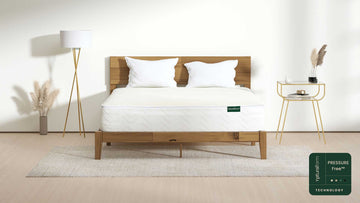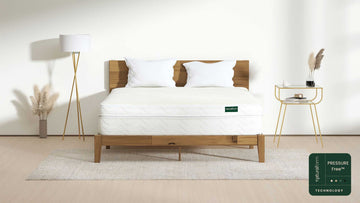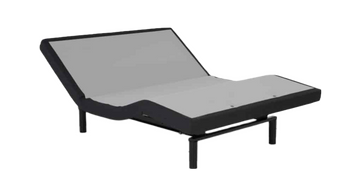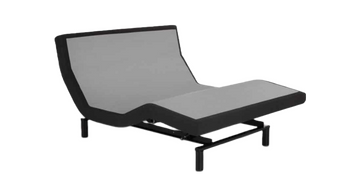You finally got your full eight hours of sleep, and then you woke up feeling stiff and sore. What’s up with that? Instead of feeling rested and rejuvenated you felt aches and joint pain.
There can be a number of things at play that are causing you to wake up feeling worse than when you went to sleep. Known injuries and back issues can often be a culprit of morning pain. But for some, that’s not always the case. Luckily, we’ve rounded up some potential causes and tips to tackle the morning pain, so you can wake up feeling refreshed and well rested.
Morning stiffness causes
Sleep position
While your asleep, your body remains in one position for a long period of time. When you hold this position in a way that doesn’t keep your spine aligned or exerts pressure on certain points, you can certainly feel the painful effects in the morning. If your positioning causes a portion of your body to be compressed or pinched, lactic acid can build up. Therefore, you might wake up feeling sore.
You most likely determined your preferred sleeping position years ago, so try studying what tweaks you can make to your sleep position to be sure you are doing it correctly. Whether it’s adjusting your shoulder placement or placing a pillow under your knees—tweaking your sleep position can prevent compression and pinching. Truthfully, it may feel odd at first and take a lot of effort to not revert back into your standard sleeping position. But, the long term benefits are worth it.
Pillow problem
Waking up with a lot of stiffness in your neck could indicate that your pillow is to blame. The wrong pillow could still cause you morning stiffness even if you are snoozing in a proper position. Very important for your spinal alignment, a pillow is meant to keep your head in a neutral, healthy position.
Back sleepers and side sleepers tend to need loftier pillows, or ones that provide more support. If you fall under the category of stomach sleeper, a pillow with very low loft that lays almost flat is best. You want a pillow that keeps your nose in line with your spine, or the center of your body.
Sleep surface
Sometimes, swapping out your pillow and some trial and error with your sleep position still won’t give you a pain-free morning. In most cases, those who experience chronic morning stiffness and pain should look to their mattress.
When examining the pain-inducing qualities of your mattress, you first want to look at firmness. Too many people are sleeping on the wrong mattress and wind up with a myriad of issues. If you find yourself waking up with a stiff and sore lower back, your mattress may be too soft. If joint and shoulder pain is a problem, your mattress may be too firm.
Your second step in examining your mattress, is looking at the materials. Contouring foam layers will comfort and support your body as you move and adjust throughout the night. Sophisticated technology that will reduce pressure—unlike springs that may increase pressure— is the best way to ensure that you are in proper alignment all night long. An adjustable base can sometimes aid in providing additional support, and can be a great solution for aiding with other sleep issues, such as snoring or acid reflux.
And don’t even get us started on the age of your mattress! If your mattress has fulfilled its life-span of about seven to ten years, you might want to think of getting a replacement. If you’re unsure if your mattress is too old, we’ve got an article to help you determine if it’s time.
Inflammation
You may have already heard that many health issues are linked to inflammation. New research from Manchester University revealed that the reason we are aching and sore in the morning is because the body suppresses inflammation while we sleep. Think of it as—when you wake up, your body’s natural ibuprofen hasn’t kicked in yet.
If you wake up feeling sore and stiff, but eventually feel pain-free throughout the day and at bedtime, then inflammation may be to blame. When we start moving around in the morning, the inflammation suppressing proteins activated while sleeping will begin to wear off. Which explains that once you begin your day, the pain begins to fade.












